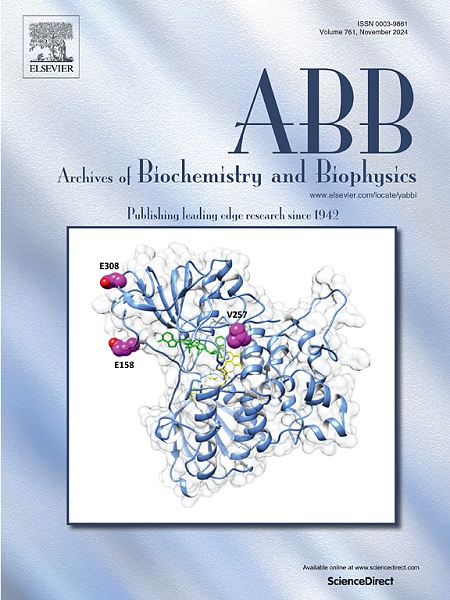Triazole-quinoxaline attenuates epithelial-to-mesenchymal transition by suppressing the Wnt/β-catenin pathway in human colorectal cancer cells
IF 3.8
3区 生物学
Q2 BIOCHEMISTRY & MOLECULAR BIOLOGY
引用次数: 0
Abstract
The Wnt/β-catenin signaling pathway regulates key cellular processes, including proliferation, migration, invasion, and epithelial–mesenchymal transition (EMT). Dysregulation of this pathway has been implicated in various human cancers, including colorectal cancer (CRC), where it plays a critical role in promoting EMT and metastatic progression. In a recent study, triazole derivatives were shown to possess anti-EMT activity in cancer cells. Building on this finding, we synthesized a triazolyl-quinoxaline-based small molecule, SRN-18, and evaluated its impact on EMT in CRC cells. Specifically, we investigated the effect of SRN-18 on the mRNA and protein expression levels of CXCR4 and CXCR7, as well as its influence on the expression of MMP-2, MMP-9, and key EMT-associated proteins. As CXCL12 is a known ligand for both CXCR4 and CXCR7, we also examined the effects of CXCL12 stimulation on cell migration and invasion. Western blot analyses were conducted to determine whether SRN-18 modulates the expression of CXCR4/7, MMP-2/9, and EMT markers in the presence or absence of CXCL12 stimulation. Additionally, our findings revealed that the Wnt/β-catenin signaling pathway is involved in SRN-18-mediated EMT suppression. Since inhibition of the Wnt/β-catenin pathway has been shown to reduce the expression of CXCR4 and CXCR7, SRN-18-mediated suppression of this pathway led to the downregulation of CXCR4- and CXCR7-associated signaling proteins, including NF-κB and JNK. In summary, SRN-18 exerted its anti-EMT effects in colorectal cancer cells by targeting the Wnt/β-catenin signaling axis and its downstream signaling cascades.
三唑-喹啉通过抑制人类结直肠癌细胞中Wnt/β-catenin通路来减弱上皮到间质转化
Wnt/β-catenin信号通路调节关键的细胞过程,包括增殖、迁移、侵袭和上皮-间质转化(EMT)。该通路的失调与多种人类癌症有关,包括结直肠癌(CRC),它在促进EMT和转移进展中起关键作用。在最近的一项研究中,三唑衍生物被证明在癌细胞中具有抗emt活性。基于这一发现,我们合成了一种基于三唑基喹啉的小分子SRN-18,并评估了其对CRC细胞EMT的影响。具体而言,我们研究了SRN-18对CXCR4和CXCR7 mRNA和蛋白表达水平的影响,以及其对MMP-2、MMP-9和关键emt相关蛋白表达的影响。由于CXCL12是CXCR4和CXCR7的已知配体,我们还研究了CXCL12刺激对细胞迁移和侵袭的影响。Western blot分析确定SRN-18是否在CXCL12刺激或不刺激的情况下调节CXCR4/7、MMP-2/9和EMT标记物的表达。此外,我们的研究结果显示Wnt/β-catenin信号通路参与srn -18介导的EMT抑制。由于抑制Wnt/β-catenin通路已被证明可降低CXCR4和CXCR7的表达,srn -18介导的该通路抑制可导致CXCR4-和CXCR7相关信号蛋白(包括NF-κ b和JNK)的下调。综上所述,SRN-18通过靶向Wnt/β-catenin信号轴及其下游信号级联发挥其在结直肠癌细胞中的抗emt作用。
本文章由计算机程序翻译,如有差异,请以英文原文为准。
求助全文
约1分钟内获得全文
求助全文
来源期刊

Archives of biochemistry and biophysics
生物-生化与分子生物学
CiteScore
7.40
自引率
0.00%
发文量
245
审稿时长
26 days
期刊介绍:
Archives of Biochemistry and Biophysics publishes quality original articles and reviews in the developing areas of biochemistry and biophysics.
Research Areas Include:
• Enzyme and protein structure, function, regulation. Folding, turnover, and post-translational processing
• Biological oxidations, free radical reactions, redox signaling, oxygenases, P450 reactions
• Signal transduction, receptors, membrane transport, intracellular signals. Cellular and integrated metabolism.
 求助内容:
求助内容: 应助结果提醒方式:
应助结果提醒方式:


